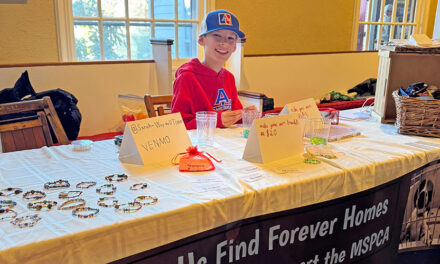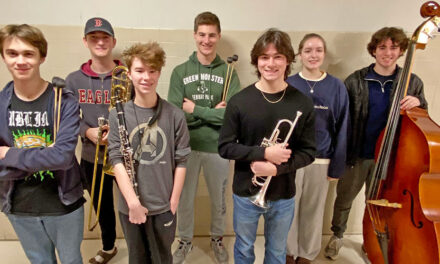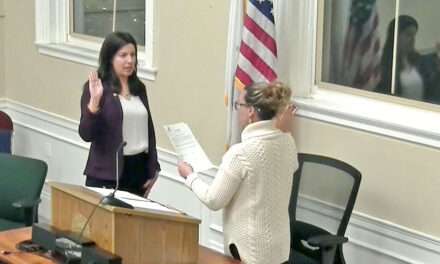Published in the October 13, 2017 edition
MELROSE — As Melrose’s biannual municipal election of candidates approaches, the city’s chief executive officer has some words of advice for voters: Evaluate office hopefuls on their contribution to the community, their positions on issues specific to Melrose and their vision for the future of our community.
And not what political party they belong to.
As divisiveness continues to plague the national landscape, more and more people are interested in local candidates’ party affiliation. Mayor Rob Dolan, who is not up for reelection November 7, shakes his head in bewilderment at this development.
In an email response to a couple of questions, Dolan explained that “one of the positive things that has come out of the recent presidential election has been a renewed sense of activism among individuals of all political stripes. A renewed and invigorated Democratic City Committee and Republican City Committee are positives for our community and that often leads to greater civic engagement, which is a good thing.
“Being a member of a political party means that you believe in a core set of beliefs and philosophies of government. Of course, that core set of philosophies is part of a candidate’s makeup and must be considered as he or she seeks elected office. At the same time, Melrose has always taken great pride in the fact that local elections are nonpartisan events: We do not run with a D or an R after our names; we all run with an M after our names, and that stands for Melrosian. No one should be naïve enough to think that political parties don’t play a role in local government. Of course they do, as they do in all elections, and I and others have benefited from them. But as national political parties become more separated, and the often visceral rhetoric between the two becomes sharper, Melrosians must be vigilant to maintain a civil and productive spirit in our local government and electoral process. I am seeing a slow erosion of this, in Massachusetts and across the country, and it is not in our interest.
“I hear more now than ever, when a new candidate is running for local office, the first question is ‘What political party do they belong to?’ That is a legitimate question. However, I encourage my fellow Melrosians to evaluate candidates on their contribution to the community, their positions on issues specific to Melrose, and their vision for the future of our community.”
The mayor continued, “In 16 years, I thankfully have yet to witness divisive partisanship within the Board of Aldermen or the School Committee. I have worked with many individual School Committee members and aldermen. There have absolutely been differences of opinion, but they have not been driven by partisan considerations. I think this is one of the reasons for our community’s success, and for the good of this city, I hope that continues.
“As an example, I have had the privilege, throughout my tenure as mayor, to work with many presidents of the Board of Aldermen and chairs of the School Committee. We are the leaders of the three branches of local government. All of us are elected in nonpartisan elections, but it should be noted that many have been Republicans and many have been Democrats. We have never brought personal party affiliation into any of our discussions or decisions. None of us has ever asked for the party affiliation of a prospective commissioner or volunteer, and I have appointed—and the board has confirmed—hundreds of appointees over the years to boards and commissions that have important influence over conservation, planning, public health, and a host of other issues. The only questions asked are ‘What are your qualifications?’ and ‘What contribution would you like to make to the City of Melrose?’ This is how government needs to run in order to be effective.
Dolan said he has “great confidence in the future of our community and local government in Melrose. However, if the national trend of fierce and immovable political party ideology finds its way to local government, I have deep concerns for the future of cities and towns, large and small, and this country as a whole. Local government is hard, and it’s painfully local, in some cases by neighborhood and by home. Local government has the largest impact on individual people’s lives. Any gridlock in local government would significantly hurt people of all ages and backgrounds—not just in the abstract but in the day-to-day functioning of public schools, police and fire departments, and individuals and businesses. Gridlock is simply not an option, while at the federal level it is accepted and institutionally encouraged.
“I believe our tradition of nonpartisan elections at the local level is why cities and towns have emerged across the country as the most effective, accountable, and results-driven bodies of government in the nation. That must be maintained here in Melrose.
“The nation and the city have seen a rebirth in activism and political passion. Those are great things, and they should be encouraged. This has resulted in more candidates for office and more public dialogue, as people who never before called an elected official have been moved to pick up the phone and make their feelings known.”
Dolan concluded, “It must be pointed out, however, that there really is no partisan way to pick up the trash, or plow snow, or plant trees, or fix a park, or make sure there is enough space in our schools, or keep a neighborhood safe. Party affiliation and ideology are a fact and should be celebrated as institutions that have made America stronger. However, they are less important at the local level than the basic principles of good government—and on this we can all agree.”
Wakefield Town Administrator Stephen P. Maio has made similar observances.
“Wakefield has a pretty good record of bipartisanship with our local Democratic and Republican Town Committees,” Maio said. “But I have heard of (divisiveness along party lines) happening in other communities.”
Maio said that the idea of evaluating municipal candidates based on national or statewide issues was concerning.
“It would be too bad if someone’s stance on abortion, for instance, would determine whether you’re going to vote for that person for municipal office,” Maio said.
Maio said that such a litmus test could lead to an advantage for local candidates who answer the surveys to the satisfaction of their respective parties and result in successful candidates who are less focused on local issues and more interested in making a splash within the larger party.
Maio also said that he sees harsher, or “more unkind” tone in national politics that also surfaces on social media. He said that he would not like to see that tendency toward “demonization” of political opponents filter down to the local level either in municipal elections or Town Meeting.
Wakefield has seen involvement of state political parties in local elections as recently as last spring’s Town Election, where several candidates reportedly received in-kind donations from state parties.




